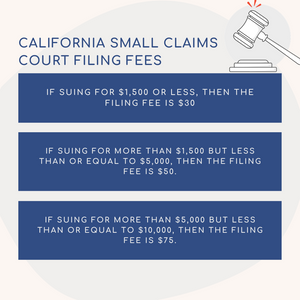Contents
How much does it cost to file a small claims court case? On average, you will spend around $30- $75 in court fees for your small claims court case. If you win your case, you can request that the defendant reimburse you for your court fees. 💰
What cases can be filed in Small Claims Court in California?
As long as there isn't another court better suited to file the lawsuit, then the lawsuit can be filed in small claims. The most common types of small claims lawsuits in California County Small Claims Court are:
Landlord/Tenant disputes over the security deposit.
Landlord/Tenant disputes over unpaid rent.
Roommate disputes.
Disputes over loans.
Contracts (written and verbal).
Auto accidents.
Disputes over auto repairs.
Disputes over remodeling or home repairs (disputes with contractors).
Damage caused to property.
Unpaid bills.
California Small Claims Court Limits 
In California, a small claims court was set up as a quick and efficient forum to resolve disputes. This is also known as the "small claims court limits." In California Small Claims you can sue for the following maximum amounts:
What are the California Small Claims Court Filing Fee
The amount you will pay to file a small claims lawsuit in California depends on how much you are suing for. You will pay between $30 to $75 to file the lawsuit. If cannot afford to pay court fees, you can ask the court to waive the fees.
What are other costs for Small Claims Court?
In most small claims cases, you can expect to pay:
Filing fees (see above) $30- $75
Serving Costs can range from $0-$75 per person you sue.
If you win, you can request that the losing party pay for your court fees and serving costs.

California Small Claims Court Filing Fees
Fees to Serve the Defendant Using the Court Clerk
Once you file your small claims court case, you need to serve the defendant. There are many ways to serve the lawsuit. One way is to ask the Court Clerk to serve the complaint.
Costs: Around $10-$15 (costs differ depending on the county).
The court clerk notifies the defendant of the lawsuit by mailing the documents using certified mail. Only the Court Clerk can serve using certified mail.
The defendant must sign the certified mail receipt clearly (if no signature or illegible signature, then service is invalid). We do not recommend this option as it is only successful 50% of the time (and according to some sources it is only successful 5% of the time) 🛑.
We recommend you serve the defendant using a process server, the sheriff, or a friend instead of using the court clerk.
What happens on the hearing date?
How long is the hearing process?
Most small claims cases take 2-3 months from start to finish. The typical small claims court case takes three steps:
Once you arrive at the courtroom, locate your case on the paper schedule outside the courtroom door.
Outside of each courtroom, there will be a printed list of the lawsuits that have hearings on that day.
You want to locate your lawsuit on the schedule. If you don't see your lawsuit listed, but you have received notice that your lawsuit will have a hearing that day, you may want to try and speak to the sheriff or clerk in the courtroom.
Make sure to use that waiting time to organize your evidence or go to the restroom.
Once the courtroom is opened, the court clerk, sheriff, and judge will go through what to expect. You will be sitting in a room with other people who have filed small claims lawsuits. You will get to watch the hearings before yours. Make sure you are in the courtroom when your case is called!

Camila Lopez, Esq.
Attorney at JusticeDirect. Camila holds a law degree and is a certified mediator. Her passion is breaking down complicated legal processes so that people without an attorney can get justice.

